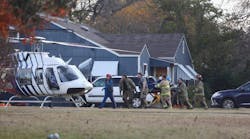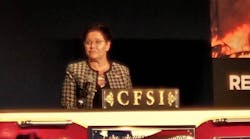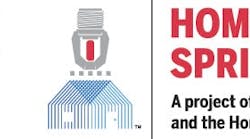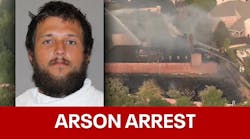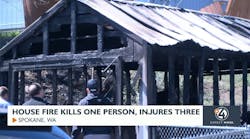BOSTON - Of the hundreds of life safety officials attending a presentation about the deadly Station Nightclub fire here Tuesday afternoon, none listened more intently than Albert Gray.
Unlike the others, the events of that cold Feb. 20, 2003 have forever changed Gray's life. His son, Derek, was killed in the inferno that claimed 100, and left 200 injured.
It was just after 11 p.m., and a rock band, Great White, had just started its performance. The tour manager set off fireworks which ignited flammable foam.
Patrons originally thought the flames and smoke were part of the production. That was until the lead singer said into the microphone that it wasn't good.
Although there were several exits, fire officials said the majority headed for the door they entered, causing a deadly stampede.
On the videos shot inside that deadly night, Gray said he can see his 6'6" son and his friend, helping get people out.
People involved with the investigation of the fourth deadliest nightclub fire in U.S. history reviewed their findings and follow-up studies during the annual NFPA World Safety conference.
Rhode Island Chief Deputy State Fire Marshal R. Michael DiMascolo said the building that housed the nightclub had been used previously as a restaurant and sports bar. That allowed them to be grandfathered in, and skip regulations required of other clubs.
DiMascolo said he focused on evidence collection, outlining where the bodies were located, and removing the victims.
He said he vowed to work diligently so that there's not another Station Nightclub incident. DiMascolo struggled to maintain his composure as he spoke of treating each victim with the respect and dignity they deserved. "It dramatically changed my life."
Former Rhode Island Fire Chief George Farrell outlined changes to codes and regulations that occurred after the tragedy. Grandfather clauses were the first to go.
However, he said the fight for tougher codes continues. Some of the same legislators who passed laws following the incident are now being pressured to allow exemptions once again.
NIST authorities conducted numerous tests and simulations, and concluded that a sprinkler in the drummer's alcove alone would have changed the outcome of that tragic night.
Gray said he is still angry that the industry that he had dedicated his life to cost his son and the other young people their lives. "I just can't believe there were that many people in there. We can put men on the moon but we can't provide a safe place for people to listen to music?"
"In three minutes, everything was gone. I blame the inspectors, the owners, the band. There should have been more indictments..."
And, his eyes tear when he starts talking about the punishments doled out. Yet, Gray isn't willing to sit by, and do nothing. He's been appointed to a task force to promote codes, training and education in an effort to prevent a similar incident in Massachusetts.
Aware of proposals by some to cut corners and skirt the codes, he warns: "You can't let your guard down...I'm fighting for everyone else now..."
